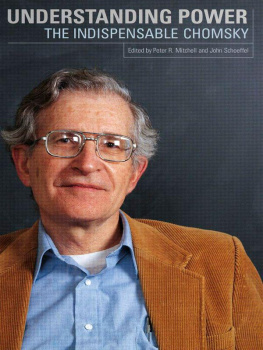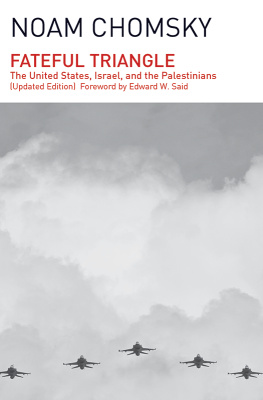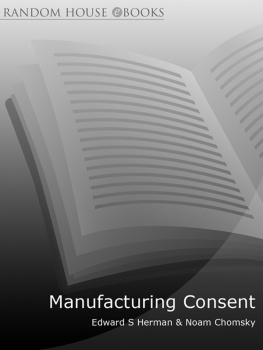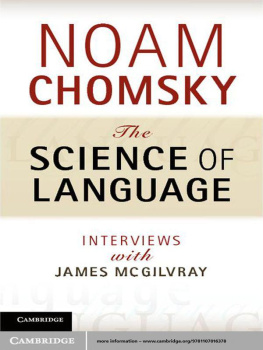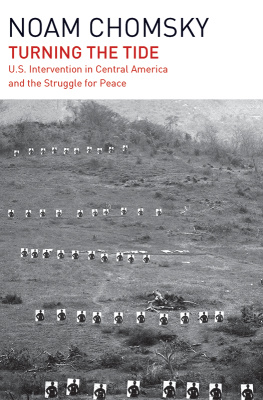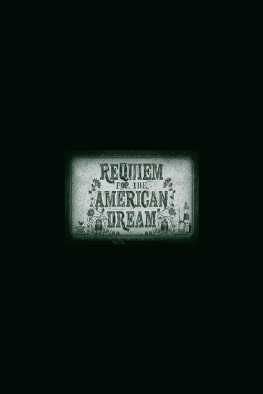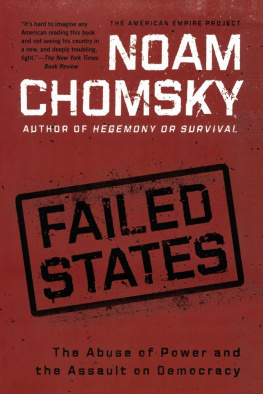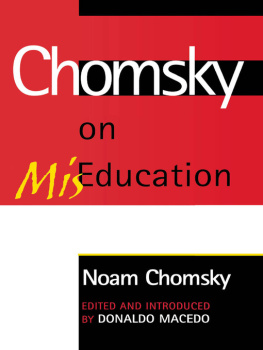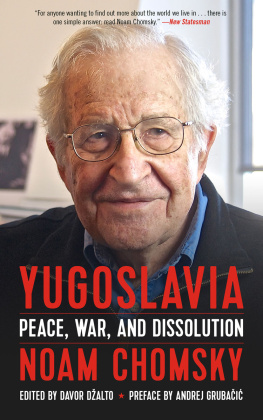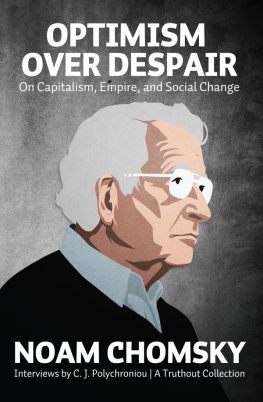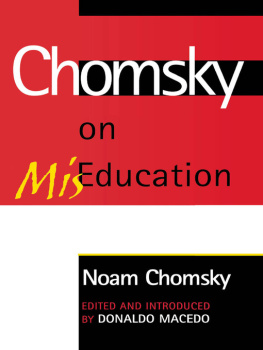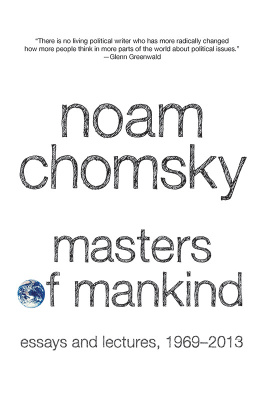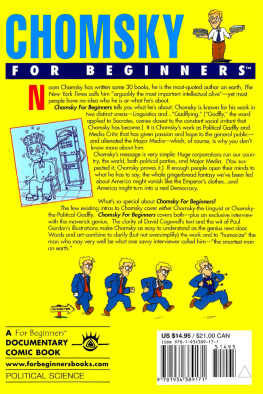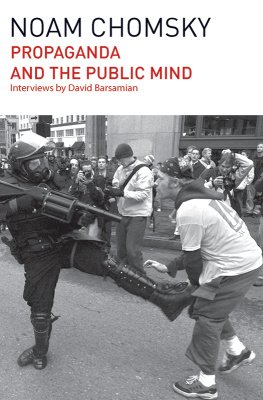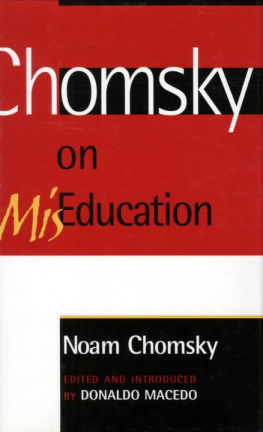Understanding
Power
Understanding
Power
The Indispensable
Chomsky
Explanatory footnotes available at
www.understandingpower.com
Edited by Peter R. Mitchell
and John Schoeffel
SCRIBE PUBLICATIONS MELBOURNE
Scribe Publications Pty Ltd
PO Box 523
Carlton North, Victoria Australia 3054
Email: info@scribepub.com.au
First published in the United States by The New Press, New York 2002 First published in Australia and New Zealand by Scribe Publications 2002 Reprinted 2002, 2003, 2005, 2009, 2010
Published by arrangement with The New Press, New York
Copyright Noam Chomsky, Peter R. Mitchell & John Schoeffel 2002
All rights reserved. Without limiting the rights under copyright reserved above, no part of this publication may be reproduced, stored in or introduced into a retrieval system, or transmitted, in any form or by any means (electronic, mechanical, photocopying, recording or otherwise) without the prior written permission of both the copyright owner and the above publisher of this book. Explanatory footnotes available at www.understandingpower.com
Printed and bound in Australia by Griffin Press
National Library of Australia
Cataloguing-in-Publication data
Understanding power : the indispensable Chomsky.
ISBN 9781921753923 (e-book.)
1. Chomsky, Noam - Political and social views. 2. Chomsky, Noam - Interviews. I. Mitchell, Peter R. II. Schoeffel, John. 320
www.scribepublications.com.au
Contents
This book brings together the work of one of the most remarkable political activists and thinkers of our time. The discussions span a wide array of topicsfrom the workings of the modern media, to globalization, the education system, environmental crises, the military-industrial complex, activist strategies, and beyondand present a revolutionary perspective for evaluating the world, and for understanding power.
What distinguishes Noam Chomskys political thinking is not any one novel insight or single overarching idea. In fact, Chomskys political stance is rooted in concepts that have been understood for centuries. Rather, Chomskys great contribution is his mastery of a huge wealth of factual information, and his uncanny skill at unmasking, in case after case, the workings and deceptions of powerful institutions in todays world. His method involves teaching through examplesnot in the abstractas a means of helping people to learn how to think critically for themselves.
The opening chapter introduces two themes that underlie nearly every aspect of the book: the progress of activism in changing the world, and the role of the media in staving off that activism and in shaping the way we think. The book follows a roughly chronological order, and begins with four discussions that took place in 1989 and 1990the dawn of the post-Cold War era. These first chapters lay a foundation for Chomskys subsequent analysis. The remaining chapters explore more recent developments in U.S. foreign policy, international economics, the domestic social and political environment, as well as activist strategies and problems. The book and its accompanying footnotes bring Chomskys analysis right up to the present day.
The internet has enabled us to place extensive documentation in our footnotes, which appear at the books website. These vast online notes go well beyond mere citation to sources: they include commentary on the text, excerpts from government documents, significant quotations from newspaper articles and scholarship, and other important information. Our goal was to make accessible much of the evidence supporting each of Chomskys factual assertions. The notes also add additional depth for those interested in a given topic.
The complete footnoteswhich are longer than the text itselfcan be easily downloaded from the books website, www.understandingpower.com (they can also be accessed through www.thenewpress.com ). Information about obtaining a bound printout of the notes is available on the website, or by writing us in care of the publisher.
The book was put together as follows. We transcribed tapes of dozens of question-and-answer sessions, edited them for readability, then reorganized and combined them to eliminate repetition and present the analysis in a coherent progression of topics and ideas. Our aim was to compile an overview of Chomskys political thought that combines the rigor and documentation of his scholarly books with the accessibility of the interview format. Always we remained faithful to Chomskys own language and answersand he reviewed the textbut it was necessary to make superficial alterations for structural and stylistic reasons.
Most of the material is from seminar-style discussions with groups of activists, or from question periods after public talks, held between 1989 and 1999. Some of the answers in chapters 6, 7, 8 and 9 are taken from conversations between Chomsky and Michael Albert. Questioners are identified as Man or Woman because frequently this device reveals when the same person is pursuing a line of questioning, or whether somebody else has taken over.
We have personally checked and verified the sources cited in the footnotes, except for certain foreign language materials. Most of the sources are those Chomsky relied upon when making his comments in the text, but some are not. Emily Mitchells assistance in retrieving reams of this material in the final months of our work on this project was invaluable. We direct readers to footnote 67 of chapter 1 for discussion of one common misunderstanding regarding the footnotes: that the frequent citation to articles from the mainstream media is at odds with the Propaganda Model of the media, which Chomsky outlines in chapter 1.
We want to thank our parentsEmily and George Mitchell and Ron and Jone Schoeffelwhose support made the book possible.
The Editors
As this book was going to print, hijacked airplanes hit the World Trade Center and Pentagon, killing thousands and potentially triggering major repercussions in U.S. society and in the world. The U.S. media devoted huge coverage to the attacks and their aftermath. But, overwhelmingly, the media omitted a critical, accurate discussion of the context in which they occurred.
When President Bush and U.S. officials announced that America was targeted for attack because were the brightest beacon for freedom and opportunity in the world, the mainstream media in the U.S. mostly echoed the refrains. A lead analysis in the New York Times stated that the perpetrators had acted out of hatred for the values cherished in the West as freedom, tolerance, prosperity, religious pluralism and universal suffrage. Glaringly missing from the U.S. medias coverage was a full and realistic account of U.S. foreign policy and its effects around the world. It was hard to find anything but a passing mention of the immense slaughter of Iraqi civilians during the Gulf War, the devastation of Iraqs population by U.S.-instigated sanctions throughout the past decade, the U.S.s crucial role in supporting Israels 35-year occupation of Palestinian territories, its support for brutal dictatorships throughout the Middle East that repress the local populations, and on and on. Similarly absent was any suggestion that U.S. foreign policy should in fundamental ways be changed.
This book was compiled before the events of September 11, 2001. But answers to many of the most important questions presented by those attacks will be found here. Why does the media provide such a limited and uncritical perspective, and such inaccurate analysis? What is the basis of U.S. foreign policy and why does it engender such widespread hatred of the U.S.? What can ordinary citizens do to change these situations?
As Chomsky noted right after the attacks, The people in the advanced countries now face a choice: we can express justified horror, or we can seek to understand what may have led to the crimes. If we refuse to do the latter, we will be contributing to the likelihood that much worse lies ahead. From our frightening, current vantage point, the discussions collected in this book seem more urgent than ever. We hope that the book will provide a starting point for understanding, and will contribute to the critical debatesand changesthat must now occur.
Next page
